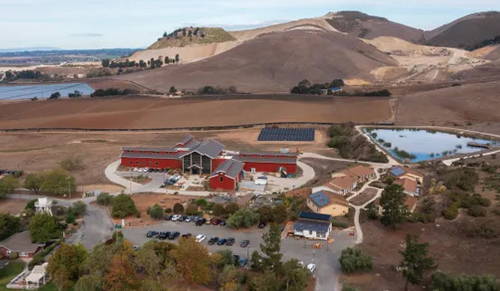
Rancho Cielo helps kids find and develop meaningful lives and avoid jail.
The word for today is “gathering,” an appropriate word for this last Sunday of the church year. This Sunday brings to a close the week of Thanksgiving, when we gather with our families, coming home to those who are near and dear to us. This is also the season of gathering, of harvest, of preparing the gardens and the fields for their winter rest, before the next season of planting and growing begins once more.
In today’s opening hymn, the familiar “Come, ye thankful people, come,” “all is safely gathered in, ere the winter storms begin.” Throughout the year, we have gathered the blessings that God has provided, and so today, we come to raise the song of harvest-home, with great gratitude for God’s goodness.
Today’s reading from the Old Testament is all about God gathering in God’s lost and scattered people. The Prophet Ezekiel pronounces an oracle of restoration to the people of Israel, who have been scattered far and wide, separated from one another, taken into exile, and now are like lost sheep without a shepherd.
“Thus says the Lord God: I myself will search for my sheep and I will seek them out…I will rescue them from all the places to which they have been scattered…I will bring them into their own land…I will feed them with good pasture…they shall lie down in good grazing land.” God says, “I myself will be the shepherd of my sheep….I will seek the lost and bring back the strayed, I will bind up the injured, and I will strengthen the weak.”
What hopeful words! No matter how far we are scattered, or how far we have strayed, God is always working to gather us back in, back into God’s love, care, healing, and safety. God comes looking for us, and for all the lost. “I myself will search for my sheep, and will seek them out.” God’s goodness and mercy follow us all the days of our lives. God gathers us in, and we dwell in God’s love forever.
God also says, “I will feed my sheep with justice.”
And so the Apostle Matthew presents the great judgement scene in his gospel, another great scene of gathering, one with which we are probably all familiar. In the scene, Jesus, Christ the King, has come in his glory, all the nations are gathered before him, and Jesus will separate the people one from another as a shepherd separates the sheep from the goats. The sheep are the ones who have provided love, care, healing and safety to the least of these. “Truly, I tell you, just as you did it to one of the least of these who are members of my family, you have done it to me.”
Those who have done for others what God has already done for us are the ones God invites into eternal life. For when we care for the least of these, we too become shepherds, searching and seeking, rescuing and providing.
In his time among us, Jesus, the Good Shepherd, gathered his followers in from tax collector’s booths, gathered them in from lives of oppression and hopelessness, gathered them out of their old lives into new life, into hope and healing.
And then he gives to his followers the disciples, and to us, the authority to go out and to seek the lost, and to be God’s love and light in the world through our actions, to enter into God’s very heart, and to become part of the eternal flow of love that God constantly pours out into creation.
Because we have been gathered in by Jesus, in gratitude we go out to gather in the lost, the scattered, the strayed, the injured, and the weak ones of this world, the ones that Jesus calls “the least of these” into God’s healing love.
Maybe some of you have read this article online, an article from USA Today, written by Elizabeth Weise, entitled “Jobs, not jail: A judge was sick of sending kids to prison, so he found a better way.” I share it today because it is such a fine illustration of a person seeking out and gathering the least of these, and in doing so, transforming their lives.

Judge John Phillips
Twenty-three years ago, in the year 2000, Superior Court Judge John Phillips got called to be a shepherd. As an angry and unrepentant young man stood before the judge in his courtroom, about to be sentenced for a murder he had committed, the boy’s grandmother walked in, and the boy broke down in tears. The judge says he remembers the moment like it was yesterday. The judge said, “He was just a kid, and I’m thinking, ‘I’m sending kids to prison for life.’”
That day, the judge, who at that point had served thirteen years as a district attorney and twenty-one as a judge, and had handed out many difficult sentences, decided that there had to be a better way. He knew that the people who passed through his courtroom were for the most part hopeless, with no future, and nothing to look forward to.
Weise writes that “Phillips remembered a broken down, overgrown site up in the hills at the far eastern end of Salinas, a California farm town. The Natividad Boys’ Ranch was a moldering wreck, a juvenile incarceration facility that had been left to slowly rot after it closed in 1982. Why, he thought, couldn’t it be turned into something to aid the children of Monterey County before they arrived at a police station or stood before a judge?”
I love that part of the story too, because not only did this judge have a vision for the kids, but also for this abandoned place on earth that had been left to rot away.
Rancho Cielo opened just three years later, in 2003.
Today, this place, Rancho Cielo, (Sky Ranch), welcomes some 220 students in Monterey County each year between the ages of 16 and 24, who choose to go there. “No one is placed against their will and not all make it. But those who attend find themselves enveloped in a supportive, therapeutic but rigorous program that pushes them to places they never imagined possible.”
“The audacious effort has succeeded. While 40% of youth who go through the county’s juvenile justice system have another encounter with the law, 84.8% graduating from Rancho Cielo do not re-offend. (That’s among students who had already encountered the criminal justice system.)
And instead of the more than $110,000 a year it costs to incarcerate a juvenile in the county, Rancho Cielo costs $25,000 each year per person.
It’s become so successful that increasingly students are choosing it not because of brushes with the law but because they want a more hands-on program that will give them the support they couldn’t get in a traditional high school.”
Here’s one of the wonderful things about this project. Weise writes that “to help turn things around, the Ranch went looking for the kids who needed the program most instead of waiting for them to come to the Ranch.” The people involved in this program are the shepherds who go out and gather the lost sheep, offering them the hope of rescue.
“County jail, foster programs, homeless, juvenile detention facilities. I kept saying, ‘Hey, you got a kid for us?’” said Joe DeRuosi, director of the school’s College, Career and Technical program. “We were looking for the worst of the worst.”
The students’ behavior “isn’t who they are, it’s a product of the environments they’ve been in and the things they’re going through,” DeRuosi said. Every child arrives with socio-emotional challenges. The staff’s job is to turn things around and their zeal is apparent.
“When we get them,” DeRuosi said, “they become the best of the best.”
“The school provides intensive support and intervention to help students heal and succeed. It’s the kind of support middle-class families might take for granted but for many of these students it’s new.”
“If they need clothes, they get clothes. If they need transportation, they get a bus pass. If they need help with math or English or any other subject, they get it. Many students didn’t have the money to pay for drivers ed, which isn’t typically offered in California high schools anymore. Rancho Cielo created a driving instruction program and last year drove 38 students to the DMV where they got their licenses.”
The people involved in this program remind me of the sheep at Jesus’ right hand in Matthew’s great judgement scene. Jesus says to them, “Come, you that are blessed by my Father, inherit the kingdom prepared for you from the foundation of the world; for I was hungry and you gave me food, I was thirsty and you gave me something to drink, I was a stranger and you welcomed me, I was naked and you gave me clothing, I was sick and you took care of me, I was in prison and you visited me…..truly, I tell you, just as you did it to one of the least of these who are members of my family, you did it to me.”
Gathered in—the hymn “Come, ye thankful people, come” reminds us that as we gratefully bring in our harvest, so God harvests us as well. “Grant, O harvest Lord, that we, wholesome grain and pure may be, for the Lord our God shall come, and shall take his harvest home; from his field shall in that day all offenses purge away; give his angels charge at last in the fire the tares to cast, but the fruitful ears to store in his garner evermore.”
So come, Lord, gather us in, and raise the glorious harvest home. And may we gather in your lost sheep and do what you have asked us to do for the least of these, so that we may be worthy of being gathered into your kingdom.
